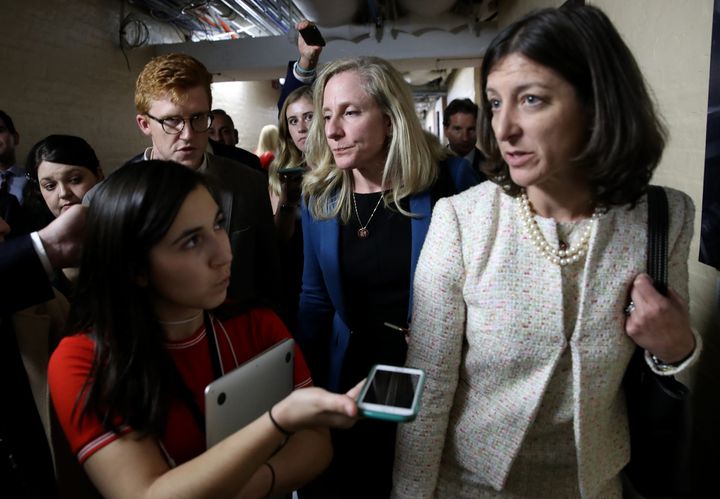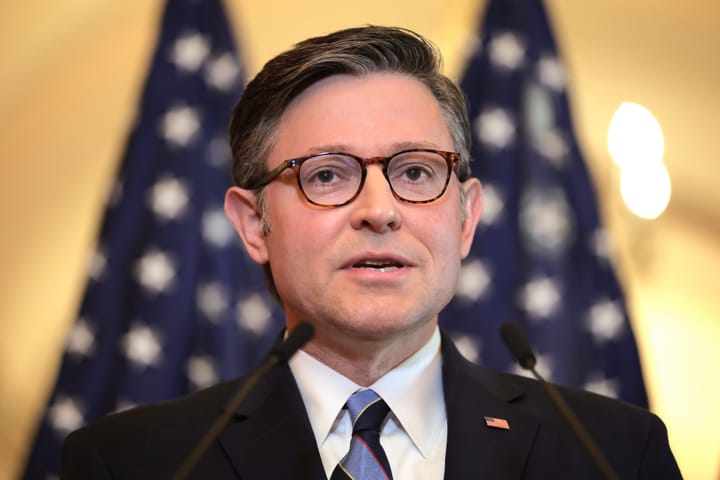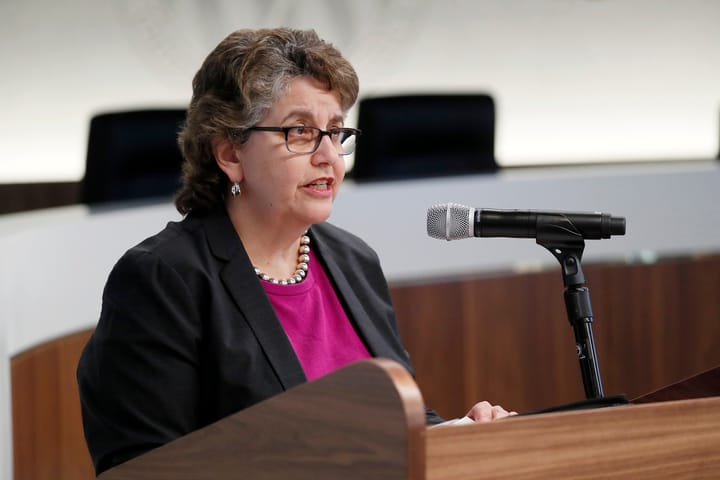In the 2018 election, a campaign finance pledge with a bold name caught on with an array of Democratic candidates: No Corporate PAC Money. Some 85 Democratic candidates who won their primaries that cycle agreed not to accept contributions from PACs controlled by corporations, according to End Citizens United, the PAC that organized the pledge. The trend surged to 155 candidates in the 2020 elections.
Now, the No Corporate PAC Money pledge is seeing its first defection: Rep. Elaine Luria (D-Va.), who is dropping the pledge altogether, according to Roll Call.
Micaela Isler, executive director of the National Association of Business Political Action Committees, confirmed with Sludge over email that a Dec. 8 virtual fundraiser invitation from Luria indicates the congresswoman is now taking PAC dollars without restrictions.
Before joining Congress, Luria had been a vocal advocate for the pledge. In a 2018 debate, she said “a key tenet in my campaign is that I am not accepting any corporate PAC contributions,” adding that she believed drug company PAC money was the reason Congress had failed to cut prescription drug costs.
Sludge’s inquiries to Luria’s campaign email and congressional office did not receive a response. The Roll Call article states that their press inquiries have been unreturned for what is now nearly two weeks. When Luria’s office confirms her change of position, it will likely make her the first Democratic House member to renounce the commitment, though other incumbents have wavered in their past compliance.
“Representative Luria made this pledge to her constituents as a reflection of her values,” said End Citizens United President Tiffany Muller. “Breaking it would demonstrate that her values have changed since she’s been in Washington or that she wasn’t sincere to voters in the first place. It will be a heavy burden on her to explain to voters why she is going back on her word.”
In its practical effects on fundraising hauls, the pledge is a minor measure for the vast majority of Democratic candidates, for whom corporate PAC contributions make up a small percentage and who stand to gain from increased small-donor enthusiasm. Signing the pledge signals concern with how insider access and special influence typically arise from a stream of PAC donations from heavy-lobbying industries. 52 current members of the U.S. House have taken the pledge, according to End Citizens United, which tracks every U.S. House and Senate member in online scorecards.
Previously, Luria had spoken out strongly on the importance of “living her value of reforming campaign finance laws,” saying in an Oct. 2018 debate, “I can tell you that a key tenet in my campaign is that I am not accepting any corporate PAC contributions. Not from prescription drug companies, not from oil companies, not from health care companies, not from private prisons, not from anyone who can influence my vote when I go to Washington.”
A Pledge With Many Loopholes
Luria and some of her fellow signers quickly worked to circumvent the pledge and keep PAC funds flowing to their campaigns shortly after joining Congress. In the 2020 election cycle, Luria was among at least six House Democrats who accepted cash from a shell PAC set up by the campaign treasurer of freshman Rep. Max Rose of New York that was funded exclusively by corporate PACs. Many more of the signers take funding from the New Democrat Coalition’s PAC, which rakes in millions of dollars every cycle from the PACs of nearly every large corporation. Luria accepted $3,000 from Rose’s shell PAC and $18,000 from the New Democrat Coalition Action Fund PAC in the 2020 cycle.
In 2018, Luria defeated incumbent Republican Scott Taylor with 51% of the vote, a difference of just over 6,000 votes, and in 2020 held off Taylor’s challenge with 51.5% of the vote to win reelection in Virginia’s Second Congressional District, an area around the cities of Virginia Beach and Norfolk.
Luria appears to have backed away from the pledge and begun taking corporate PAC donations in the months before the 2020 election, according to Sludge’s review of campaign finance records. Luria’s campaign committee took $2,500 from the PAC of law firm Greenberg Traurig on September 14, a corporate PAC contribution that End Citizens United confirmed by email would be a violation if not refunded. The PAC of Serco, Inc., an IT company, contributed $2,000 to Luria’s campaign committee on Nov. 18, which would make it among the first post-election corporate donations to go through to Luria. In the Luria campaign’s post-general report released last night, which covers through Nov. 23, the contribution from Serco’s PAC is not reported, meaning that the campaign likely delayed processing the donation until after that November reporting deadline. It is possible that Luria’s campaign has returned the contribution in question or plans to do so, but her office’s lack of responsiveness implies that she intends to put off disclosing corporate PAC contributions until the year-end report to be filed on Jan. 31, 2021.
In the weeks before Election Day, Luria also took a number of donations from trade associations that represent corporations, though those contributions do not violate the letter of the pledge, according to End Citizens United. Donations to Luria’s campaign include $2,500 from the PAC of the U.S. Chamber of Commerce, $1,000 from the American Hospital Association PAC, and $2,500 from the National Beer Wholesalers Association PAC on Oct. 23.
Many pledge signers accept contributions what the FEC calls “nonconnected” PACs, such as those of partnerships or unincorporated associations, and from the PACs of trade associations. Nonconnected PACs do not have a sponsoring organization and are allowed to solicit contributions from anyone, whereas corporate PACs are connected to a sponsoring company and can only raise funds from individuals related to that company.
The PACs of trade associations are classified by the Center for Responsive Politics as “business-related” because of their closeness to corporate entities, but their statements of organization with the FEC do not say they are connected to a corporation, and therefore their contributions would not be in violation of the letter of the pledge. These gaping loopholes in the No Corporate PAC Money pledge were described last year as “hypocrisy” by Dr. Steven Billet, director of the legislative affairs program at George Washington University.
Luria is still listed as a signer of another campaign finance pledge, No Fossil Fuel Money, organized by the social welfare organization Oil Change U.S., which has recruited over 50 members of Congress, including over 40 U.S. representatives, and more than 250 state elected officials to “pledge not to take contributions over $200 from oil, gas, and coal industry executives, lobbyists, and PACs.”
But fossil fuel industry money still found its way into the campaign coffers of Luria and others. The PAC of the New Democrat Coalition, which contributed $5,000 to Luria’s 2018 campaign, has been funded by fossil fuel industry giants such as ExxonMobil, American Petroleum Institute, and General Electric, according to FEC records. One of Luria’s congressional positions is co-chair of the New Democrat Coalition Climate Change Task Force, which says it seeks to “eliminate barriers to growth for pro-climate businesses” and “support market based mechanisms to reduce greenhouse gas pollution” in reaching the targets set by the Paris Climate Agreement.
Last year, Brendan Fischer, the federal reform program director at the non-partisan Campaign Legal Center, outlined several ways that candidates can go further than the symbolic No Corporate PAC Money pledge, such as swearing off all PAC contributions, disclosing campaign bundlers, and eschewing super PAC support.
In March 2019, the Democratic-controlled House passed H.R. 1, the For The People Act, a package of ethics and campaign finance reform measures that was not taken up by the Republican-controlled Senate. Ethics experts flagged that the current version of H.R. 1 did not include several provisions that could build on the goals of the No Corporate PAC Money pledge in ensuring lawmakers’ independence from donor influence. For one, members of Congress could ban contributions from entities under the jurisdiction of their committees; for another, House leadership could provide adequate budget for congressional offices to offset how well-resourced lobbyists shape legislation on behalf of their clients.



